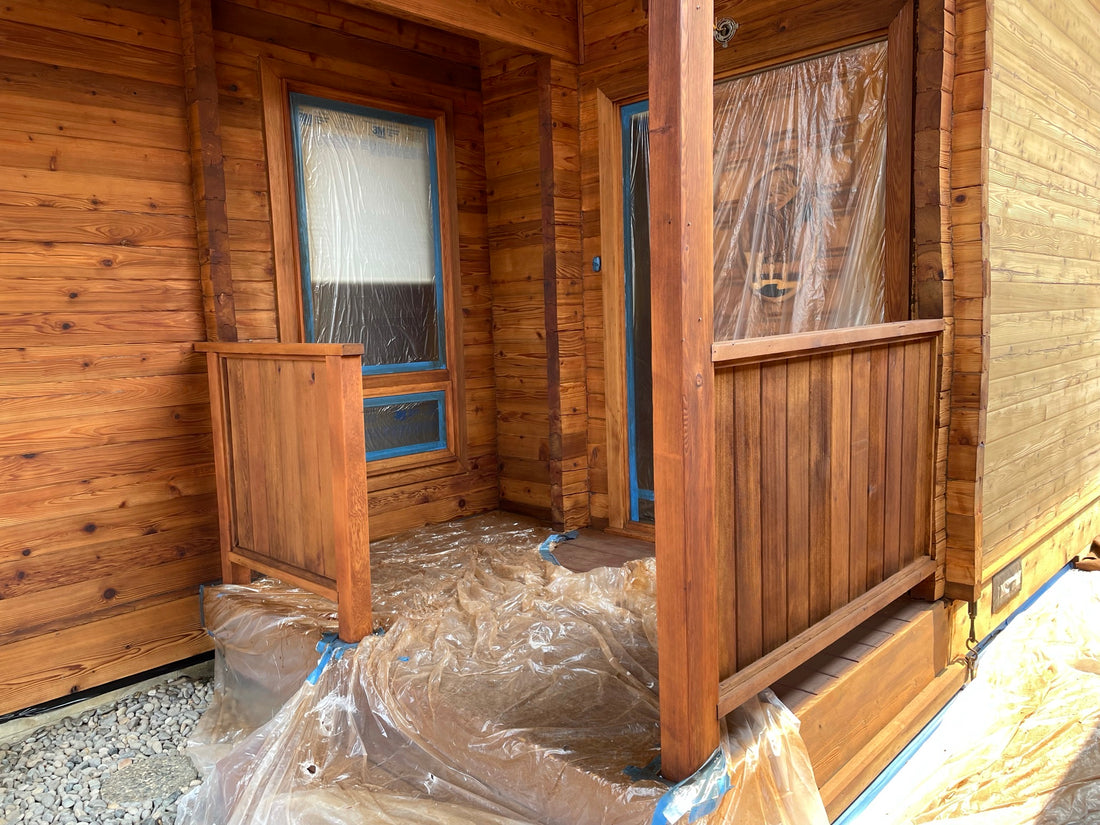
WHAT DO YOU DO WHEN WOOD WON'T ABSORB STAIN?
Share
Picture this — You're in the middle of tackling another big DIY project on your to-do list. You’ve picked out a great colored stain that’s going to perfectly accentuate the grain and natural character or your boards. You carefully brush the stain onto the wood and wait.
Hours pass and you realize that the wood is not absorbing the stain. The wood feels tacky and wet. “What is going on?” You may ask.
Has this ever happened to you? We’re here to help. We’ve rounded up our tips for applying stain and the most frequent mistakes when staining wood.
Most Frequent Mistakes When Staining Wood
Applying stain straight to the board
A rookie mistake for applying stain is believing you don’t need to prepare your boards before applying the stain. It's easy to assume that you could just apply the stain to the wood without preparation and return to a board that looks just like the sample at the paint store.
Greatness starts with preparation. When staining a piece of timber, you should start by sanding the wood to eliminate any scratches or gouges on the board. Sanding each board opens up the pores in the wood, allowing the stain to absorb deeper and more evenly into the board or log.
Start with a rougher, coarse grit by sanding it at 80 grit, and work your way up to 220 grit. When you’ve finished sanding each board, vacuum the dust off.
Note: If you are applying stain to an existing cabin home, your boards will likely still carry the mill glaze, which will stop the stain from absorbing into the wood to its full potential. To remove the mill glaze, heavily power wash the logs. Wearing a mask and glasses, you should use an orbital finish sander smooth out the boards.
Ignoring the instructions
Not every brand of stain will apply the same as other brands. Make sure to read the manufacturer’s instructions on the can in case they recommend a particular application process. With cabins, most manufacturers recommend one of two applicators — airless sprayers and pump-up sprayers. If they say to use an airless sprayer, use an airless sprayer.
Using Cold or Moist Boards Can Decrease Stain Absorption
Boards with high moisture content or too cool of temperatures will decrease the stain’s absorption. Aim for your boards to have a moisture content under 20%. Your boards should be 45 to 90 degrees Fahrenheit.
Changing Your Mind on Color
When it comes to staining wood, once you apply it to the wood you're more or less stuck with it. You can't just sand stain off like paint. Paint sits on top of the wood whereas stain literally stains the wood and penetrates the grain. When it comes to stain wood is practically a sponge.
How to make wood absorb more stain
Condition Your Boards
To make your boards absorb evenly, use a wood conditioner after you’ve sanded the boards. Softwoods like cedar, pine or ash don’t always absorb and can turn out blotchy. A wood conditioner will stabilize the wood and allow it to absorb the stain for a consistent golden glow.
Mix Up The Stain
Frequently stir your stain to ensure it's evenly mixed.
Back Brush Your Stain
Immediately after applying a coat of stain, vigorously back brush the boards. If you have a buddy helping you, they can work on back brushing behind you as you finish staining. This will eliminate blotches and penetrate deep into the grain.
Dry Between Wood Stain Coats For Best Absorption
Allow your boards to completely dry between coats of stain or it won’t have a chance to absorb evenly. Caulk between the boards, and come back to give your boards a second coat.
Can you overstain wood?
Wood can only absorb so much stain. Once the board has absorbed as much stain as it can, the stain will just sit on top of the wood and feel tacky even if you let it dry for days. You should wipe your excess stain off with a clean cloth when you’re done applying.
Lovitts Coating
Lovitt's Coatings provides deluxe products for wood and masonry for both the construction and restoration phases of your project. All our products are made in the USA with quality and environmental responsibility in mind. Our knowledgeable team is available to answer any other questions you may have about your project. Give us a call at (877) 966-3476
